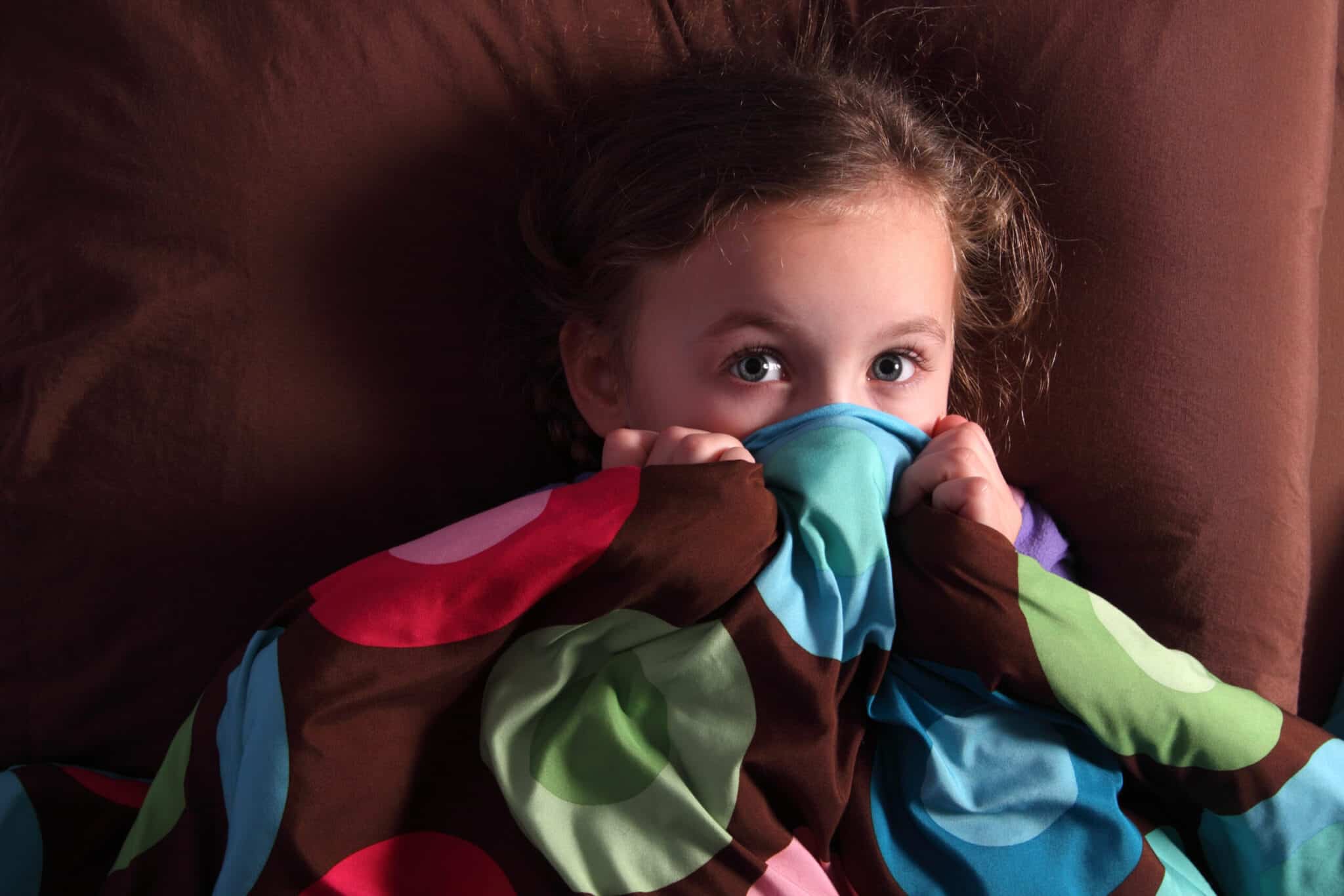
How to Relieve the 7 Common Nighttime Fears in Children
Here's what parents can do
A 25-year review of the scientific literature reported that nighttime fears in children are common, they interfere with daily functioning, and they result in considerable disruption within the family (Lewis et al 2021).
Is it Normal for Kids to be Scared at Night?
A study by Muris et al (2001) showed that 73.3% of normal children reported having nighttime fears. These fears were common among 4-6 year olds, became even more frequent in 7-9 year olds, and remained relatively stable in 10-12 year olds. It also showed that parents typically underestimated the frequency of nighttime fears as reported by their children.
Most nighttime fears are part and parcel of normal development (Muris & Field 2011) and arise from the child’s maturing awareness of the dangers that exist in the world around them. In addition, the child’s increasing cognitive ability causes them to imagine scary scenes that are either impossible or highly unlikely (e.g., ghosts, aliens, kidnappers entering the house, monsters, etc) (Ducasse 2015).
Are There Negative Consequences From Nighttime Fears?
Children's nighttime fears cause significant interference to the child's functioning as well as causing much distress for the child and family (Gordon et al 2007). Not only do parents suffer from lack of sleep and become irritable, but children suffer from moodiness and daytime tiredness caused by poor sleep which can detract from the child's school learning and the quality of their relationships (Rafihi-Ferreira et al 2018).
Nighttime fears are responsible for emotional upset in the child including crying, panic, tantrums at bedtime, loss of confidence, self-disparaging negative statements, and a feeling of social embarrassment, as well as behavioral disturbances such as wandering alone in the house at night, calls for parental or sibling comfort, bed sharing with parents or siblings, light source at night, refusal to go to the toilet alone at night, etc. (Ducasse 2015).
In addition, due to the fear, the child may avoid sleeping outside the home (e.g., school camps, friends' homes) and this can have a detrimental effect on the child’s subsequent social development (Silverman & Treffers, 2001).
Moreover, nighttime fears may continue into adolescence for some children. Persistent sleep problems in childhood are associated with an increased risk of anxiety disorders in adulthood (Gregory et al 2005).
The bottom line is this .. Your child’s scary thoughts and images should be neutralized because they will probably lead to further problems.
How Can I Help My Child with Nighttime Fears?
Fortunately, many studies have demonstrated the rapid effectiveness of Cognitive Behavior Therapy techniques with children’s nighttime fears including desensitization, emotive imagery, cognitive self-instruction, and reinforcement procedures (Gordon et al 2007).
Unfortunately, most parents do not have the time or resources to seek out a qualified therapist to provide this therapy. Furthermore, there are far too few therapists available to treat the vast number of children with nighttime fears.
However, there has been a growing interest in providing parents with therapeutic tools and resources to produce effective change with their children at home (Simon et al 2014, Lebowitz & Majdick 2020).
In my 30 years experience as a child psychiatrist I developed a simple step-by-step method based on Cognitive Behavior Therapy (CBT) principles, which I used successfully in my practice with dozens of my patients. I subsequently created an interactive online program called “Bedtime Hero” that parents can use with their kids to neutralize the scary thoughts and nighttime fears.
The 7 Common Nighttime Fears in Children
In a large study of 511 children aged 8 to 16 years Gordon et al (2007) reported that nighttime fears are comprised of more fears than simply a fear of darkness, including fears of bad dreams, nightmares, noises, shadows, monsters, intruders, burglars, kidnappers, and of being left alone at night. My experience in practice was the same, so I incorporated treatment for the 7 common types of nighttime fears into the Bedtime Hero program.
One must realize that the problem is not the actual things in the child’s environment such as the closet, the bed, the dark, being alone, intruders, etc. The problem is the child’s imagination, and the solution is to teach them how to use their strong imagination in constructive ways.
Nighttime Fear #1: Fear of the Dark
While fear of the dark is often thought to be the most common, it was reported as the main underlying nighttime fear by only 9% of the children studied (Muris et al 2001). The usual strategy advised on the internet is to use a night light. This can be helpful, but you must be sure to make it a dim light, or one that can be gradually adjusted to a very low level. It’s more helpful to desensitize your child to the dark, which is a technique of CBT (Kanfer 1975). I typically advise parents to sit with their child, turn off the lights, and wait for 5 minutes in the dark to show the child that their eyes have the ability to adjust to the darkness. Then, look at all of the things they can see, turn the lights on again and see if they guessed right. It becomes a game as they desensitize to the darkness.
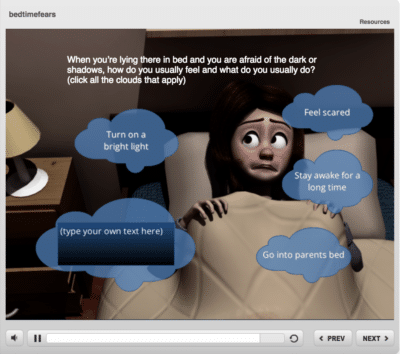
Nighttime Fear #2: Fear of the Closet or Under the Bed
As in the fear of the dark, I recommend to children that they practice looking inside the closet and under the bed in order to memorize exactly what is there. Then, get into bed and report to the parent exactly what was in the closet or under the bed. Do this as many times as it takes for them to be 100% correct. This is also a desensitization technique, but the Bedtime Hero program goes one step further with a procedure that helps the child do all of this with a feeling of strength and confidence.
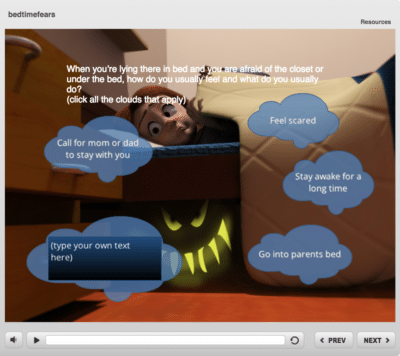
Nighttime Fear #3: Fear of Sounds
Your child is capable of imagining that the creaks in the house at night are the footsteps of someone coming up the stairs, or that a tree branch bumping the house is someone climbing on the roof. I like to explain to children that when things get hot or cold they expand and contract, and that includes houses, which is why the wooden boards creak as the house cools off during the night. Using simple explanations that a child can easily understand is a good strategy to dissipate nighttime fears. This is referred to as cognitive self-instruction (Graziano and Mooney 1980).
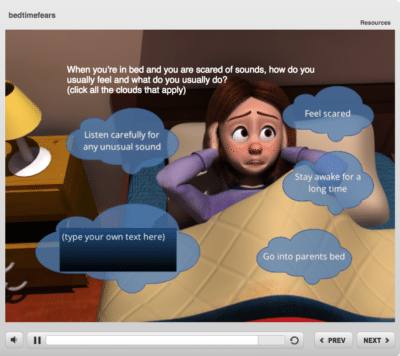
Nighttime Fear #4: Fear of Intruders
The fear of intruders, in one form or another, is by far the most common nighttime fear in children. Muris et al (2001) reported the fear of intruders (e.g., burglars, kidnappers) in 23% of children in their study, followed by the fear of imaginary creatures (e.g., ghosts, monsters) in 16.5% of children. In my opinion, both of these are intruders and both are imagined fears because burglars typically break in when no one is home and kidnappers almost always lure children out in the community, not from their homes.
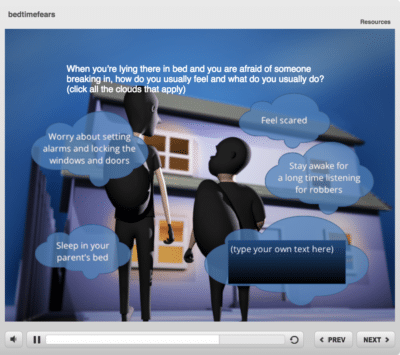
In the Bedtime Hero program I describe a strategy of making up humorous bedtime stories about the intruder, which transforms the fearful imagery into a comedy. In addition, the Bedtime Hero ebook tells the story of Royelle who overcame nighttime fears and learned to sleep confidently alone (Bibliotherapy was described as a technique by Lewis et al 2015).
Nighttime Fear #5: Fear of Bad Dreams
Nightmares (bad dreams) and night terrors are two entirely different things. Please visit Nightmares in Children to learn more.
If a child is suffering from Post-Traumatic Stress Disorder (PTSD) as a result of an emotionally traumatic life event, such as physical abuse or an extremely frightening event, they can experience nightmares in which the mind replays the traumatic incident.
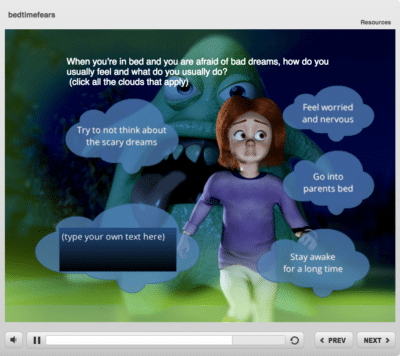
Most children, however, are simply frightened by an imaginary threat, such as being chased by a killer or a monster. I like to point out that since the dream is like a movie they are creating in their mind it means that they are the director of the movie and they can, therefore, change the storyline to anything they want (This is “emotive Imagery” as described by Jackson and King 1981).
One little 6-year-old girl had been traumatized by watching “Friday the 13th” at a friend’s birthday party (obviously a poor choice of videos at that house). With my encouragement she gleefully imagined the killer Jason transforming into a rubber ducky whenever the image of him came up in her mind. That was the end of her nighttime fears.
Nighttime Fear #6: Fear of Being Alone
The fear of being alone is the same as separation anxiety because the child is afraid to sleep by themselves without the parent close by. However, the fear of sleeping alone, by itself, is not sufficient to diagnose Separation Anxiety Disorder because symptoms must also be evident during the day in other life situations (see How to Help Your Child Sleep Alone Without Anxiety for a full description).
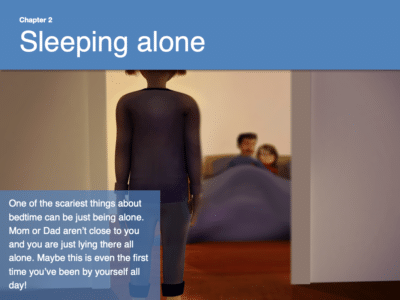
A simple behavioral strategy is for a parent to tell the child after tucking them in that they will return in 10 minutes to check on them. Usually, most children will be ok with 10 minutes, but the length of time can be shorter if necessary. At the 10 minute check-in the parent can say they’ll come back in another 10 minutes, and so on, repeating this as many times as necessary until the child has clearly fallen asleep. No child can ever stay awake all night long! With a successful night or two of this procedure the parent can then gradually lengthen the interval to 12 minutes, 15 minutes, as so on until the whole checking thing has become unnecessary.
Occasionally, I have found a child who was totally unable to sleep alone and needed to sleep with the parent. In those cases, I suggested making a temporary bed on the floor for the child near the parent’s bed. Then, the child’s bed was gradually moved farther away and closer to their own room along with rewards and reinforcement for positive progress (Gordon et al 2007).
Nighttime Fear #7: Waking in the Night
The fear of awakening during the night is due to the child’s awareness that everyone else is asleep and not available for support. The house is quiet and dark and the child may have had a bad dream. However, helping the child go back to sleep only requires that the parent do the same thing they did when the child first went to bed, such as checking every 10 minutes, reviewing the funny ending for a bad dream, discussing sounds in the house, etc. CBT interventions have repeatedly shown positive results with relatively rapid outcomes and high success rates (Sadeh 2005).
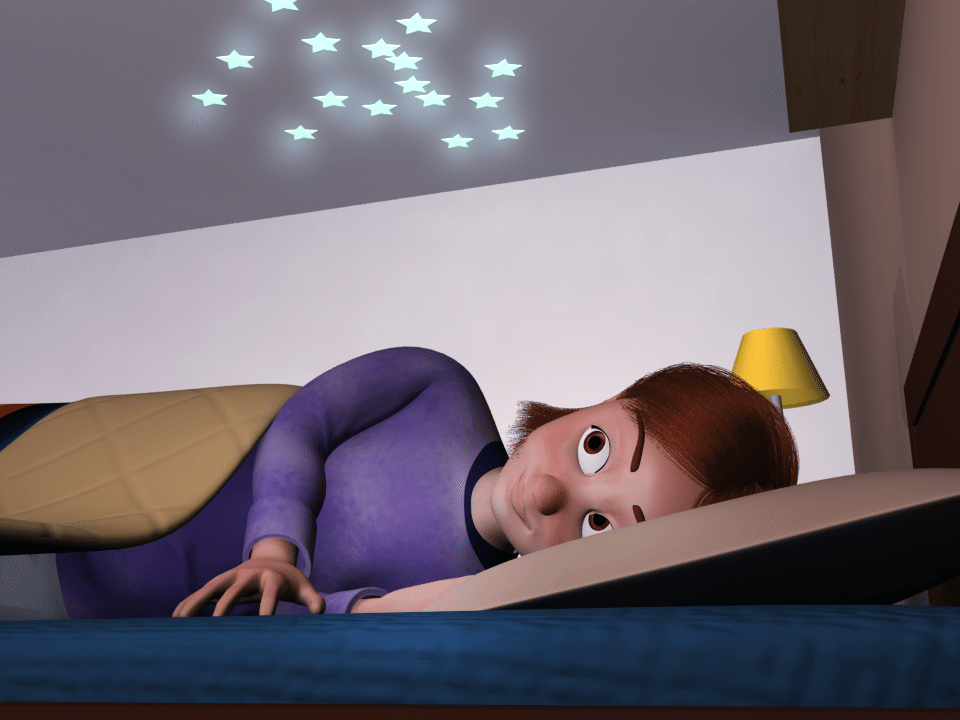
How Afraid is Your Child?
Most research studies make use of a scale of some kind to measure the severity of a child’s fear (Orgilés et al 2021). Bedtime Hero provides a simple thermometer type scale that your child can use to rate their level of anxiety or fear, which can be useful for tracking their progress. It’s also common for a child to have more than one fear, so as one fear is resolved the next underlying fear can be easily identified by using the scale and asking the child to say what is still bothering them.
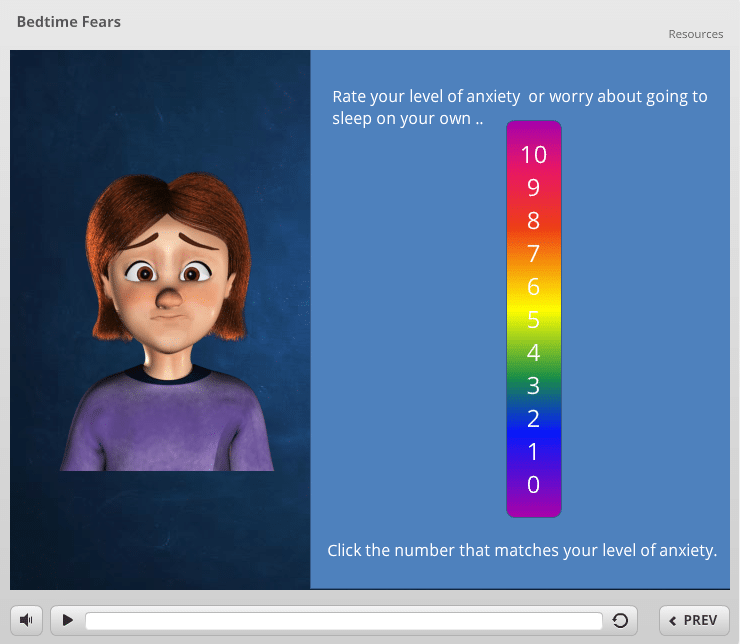
How Your Child Can Become a Bedtime Hero
The Bedtime Hero online program and ebook provides everything you need to help your child learn to sleep on their own comfortably and confidently with no more nighttime fears. It has already helped hundreds of children around the world learn to overcome their nighttime fears.
All of the strategies described above are included in this program, but there is more that cannot be easily presented here. In particular, there is a therapeutic procedure contained in each of the 7 Common Fear sessions that helps your child access their inner strength and good feelings because this is the most effective way of helping your child make use of their powerful imagination in constructive ways.
I have made it easy for parents to participate. The cost is super low compared to counselling, workshops, or online subscriptions, and the results are guaranteed. A 1-year membership gives you unlimited access to the interactive Full Program sessions which address all of the common nighttime fears in children and includes a final confidence-boosting session.
Furthermore, I provide a 100% money back guarantee. If your child does not experience a noticeable improvement in their nighttime fears within a few sessions you can obtain a full refund upon request.
Sign Up Now
to Receive Your Free
QuickStart Email Series for Parents
PLUS
Your Free Access to
the Bedtime Hero Program
* Your email address will not be shared with anyone.
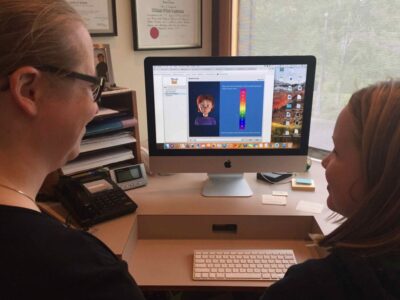
"This has been the best and most helpful tool yet with my 8 year old and her sleep anxiety. Appreciate it so much."
- Bedtime Hero Mom
About Dr Lauderdale

Copyright © 2024 by W. Mark Lauderdale MD
All rights reserved.
References
Cornwall, E., Spence, S. H., & Schotte, D. (1996). The effectiveness of emotive imagery in the treatment of darkness phobia in children. Behaviour Change, 13, 223–229.
Ducasse, D. & Denis, H. (2015). [Pathological nighttime fears in children: Clinical specificities and effective therapeutics]. Encephale, 41(4), 323-31.
Gordon, J., King, N., Gullone, E., Muris, P., & Ollendick, T. H. (2007a). Nighttime fears of children and adolescents: Frequency, content, severity, harm, expectations, disclosure, and coping behaviours. Behaviour Research and Therapy, 45(10), 2464–2472.
Gordon J., King N. J., Gullone E., Muris P., Ollendick T. H. (2007). Treatment of children's nighttime fears: The need for a modern randomised controlled trial. Clinical Psychology Review, 27(1), 98-113.
Graziano, A. M., & Mooney, K. C. (1980). Family self-control instruction for children’s nighttime fear reduction. Journal of Consulting and Clinical Psychology, 48(2), 206–213.
Gregory, A. M., Caspi, A., Eley, T. C., Moffitt, T. E., O’Connor, T. G., & Poulton, R. (2005). Prospective longitudinal associations between persistent sleep problems in childhood and anxiety and depression disorders in adulthood. Journal of Abnormal Child Psychology, 33, 157–163.
Kanfer, F. H., Karoly, P., & Newman, A. (1975). Reduction of children’s fear of the dark by competence-related and situational threat-related verbal cues. Journal of Consulting and Clinical Psychology, 43(2), 251–258.
Jackson, H. J., & King, N. J. (1981). The emotive imagery treatment of a child’s trauma-induced phobia. Journal of Behavior Therapy and Experimental Psychiatry, 12(4), 325–328.
Lebowitz, E. R., & Majdick, J. M. (2020). The SPACE program, a parent-based treatment for childhood and adolescent anxiety: Clinical case illustration. Journal of Cognitive Psychotherapy, 34(2),
Lewis, K. M., Amatya, K., Coffman, M. F., & Ollendick, T. H. (2015). Treating nighttime fears in young children with bibliotherapy: Evaluating anxiety symptoms and monitoring behavior change. Journal of Anxiety Disorders, 30, 103–112.
Lewis, K. M., Rafihi-Ferreira, R., Freitag, G. F., Coffman, M., & Ollendick, T.H. (2021). A 25-Year Review of Nighttime Fears in Children: Past, Present, and Future, Clinical Child Family Psychology Review, 24(3), 391-413.
Muris, P., Merckelbach, H., Ollendick, T.H., King, N.J., & Bogie, N. (2001). Children’s nighttime fears: Parent–child ratings of frequency, content, origins, coping behaviors and severity. Behaviour Research and Therapy, 39, 13–28.
Muris, P., & Field, A. P. (2011). The normal development of fear. In W. K. Silverman & A. P. Field (Eds.), Anxiety disorders in children and adolescents: Research, assessment and intervention (2nd ed., pp. 76–89). Cambridge University Press.
Orgilés, M., Fernández-Martínez, I., Espada, J. P., & Morales, A. (2021). The Nighttime Fears Scale: Development and psychometric evidence of a standardized self-report scale to assess nighttime fears in children. Journal of Anxiety Disorders, 79, 102369.
Rafihi-Ferreira, R., Silvares, E. F., Asbahr, F. R., & Ollendick, T. H. (2018). Brief treatment for nighttime fears and co-sleeping problems: A randomized clinical trial. Journal of Anxiety Disorders, 58, 51–60.
Sadeh, A. (2005). Cognitive-behavioral treatment for childhood sleep disorders. Clinical Psychology Review, 25, 612–628.
Simon, E., Van der Sluis, C., Muris, P., Thompson, E., & Cartwright-Hatton, S. (2014). Anxiety in preadolescent children: What happens if we don’t treat it, and what happens if we do? Psychopathology Review, 1(1), 28–50.